Student Union
Everything You Need to Know About One of the Main English-Proficiency Tests
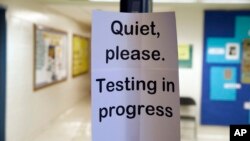
The TOEFL (Test of English as a Foreign Language) is one of two commonly used in the U.S. to see whether international students are prepared for their coursework.
Sarah Wood explains in the US News & World Report. (March 2024)
- By VOA News
Biden Administration Cancels $138 Billion in Student Debt, Should It Do More?
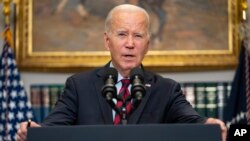
Many people view the cancellations as unfair and wasteful; others think it’s necessary, given the high cost of education and the burden it places on young people.
Danielle Douglas-Gabriel and Toluse Olorunnipa speak with activists for The Washington Post. (March 2024)
SAT Now Fully Computerized

The most popular admissions test for U.S. undergraduate programs will now be taken online and will be much shorter. Some welcome the changes; others say they contribute to a decline in reading ability among young people.
Dana Goldstein reports for The New York Times. (March 2024)
College Admissions Have Been a ‘Hot Mess’
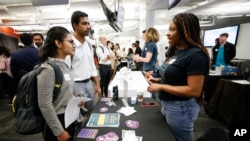
The troubled rollout of a new federal financial aid form, the end of race-based affirmative action and shifting test requirements have made things very confusing for applicants to U.S. undergraduate programs.
Oyin Adedoyin and Melissa Korn have the story for the Wall Street Journal. (March 2024)
- By Robin Guess
US program seeks to resettle, educate refugee students

Many of the newest and youngest refugees are fleeing armed conflicts around the globe.
The world’s refugee crisis has never been worse. The number has doubled in a decade to more than 100 million people, according to the U.N. High Commissioner for Refugees.
To ease the growing crisis, the U.S. State Department launched a program in January 2023 with private partnerships, called Welcome Corps, to help resettle refugees. Six months later, it launched a companion version called Welcome Corps on Campus to resettle and educate refugee students by partnering with colleges and universities.
“Certainly, the Welcome Corps on Campus is not going to solve the global refugee crisis,” said Nele Feldmann, associate director, Welcome Corps on Campus, Community Sponsorship Hub.
“I think many times we feel powerless when confronted with the scope of displacement,” Feldmann said. “And I think that programs like Welcome Core on Campus give universities and colleges and their surrounding communities a really tangible way to have a positive impact and give back to refugee communities.”
Currently, Welcome Corps on Campus has recruited students who are in refuge in Jordan and Kenya for the incoming classes of 2024 and 2025. The students sheltered in Kenya were recruited from South Sudan, Somalia and the Democratic Republic of the Congo. And the students being sheltered in Jordan were largely recruited from Syria but include some Iraqi and Yemeni students.
As the program grows, the geographic scope of the recruitment efforts will include refugees from other parts of the world.
Two for JMU
James Madison University joined the new program and will sponsor two refugees.
The school handpicked a team of five sponsors who are tasked with providing care, support and guidance to two young Kenyans coming to their Virginia campus.
“This team is going to propel them so that their story doesn’t stop at James Madison; it is going to start here,” said Christina Kilby, a sponsor and a James Madison professor of religion.
“Only 5% or 6% of refugees get to access higher education,” she added.
The sponsors are anticipating and preparing for all of the details, big and small, their two African refugees will need to address to live in Harrisonburg, Virginia, along with the 22,000 other students on the JMU campus.
“What are those first interactions going to be like and what food are we going to bring?” said Kim Davidson, a sponsor, who is also the director of the Community Engagement Center at James Madison. “And where are we going to stop on the way home, and can we bring them a pillow?”
“What’s exciting to me is introducing them to my family,” Kilby told VOA. “And having my kids get to learn from them and their experiences, and that new network they are going to build to really make possible whatever their goals are."
Another member of the school’s refugees sponsor team is associate professor Delores Phillips, director of the African, African American and Diaspora Studies Center at JMU.
“I think I want to take them out myself and see what they like and see what they know,” Phillips told VOA. “And give them some time to acclimate. And let them wander around a little.”
Starting this fall
The program’s freshman class of 33 refugees, ages 18-24 and sheltered in Kenya, will start school, the first year of the program, in the fall of 2024 at 18 U.S. colleges and universities.
And the 75 members of the class that will start in the fall of 2025 were accepted and recruited while taking shelter in Jordan. If all goes as planned, the two incoming classes of freshmen will graduate from their schools in 2028 and 2029.
The State Department has resettled 138,134 of the world’s refugees into the U.S. since 2021. But Welcome Corps on Campus is a new path for resettlement into the U.S.
As part of Welcome Corps on Campus, the State Department granted the students in the program refugee status, humanitarian protection and asylum from the problems they are fleeing, such as violence or persecution based on their nationality, politics, religion, race or social affiliations.
One of the most important jobs the five sponsors will have is to protect the refugees from stereotypes and biases, Phillips said.
“I think that stigmas and assumptions are also going to be our challenge, in terms of an institution,” she said. “We will assume that they are poor. We will assume that they are unlettered and unread. We will assume that they are dusty village people and they may not be.”
Phillips added that, prior to being accepted into Welcome Corps on Campus, some of the refugees may have had outstanding educations that are equivalent to those received at Oxford University.
"They may have actually been schooled in the Oxonian tradition,” she added.
Survey results
Republicans and Democrats in Congress, President Joe Biden and former President Donald Trump are battling over immigration policy in the U.S. Currently, anti-immigration sentiments in the country are so high that many of the schools helping refugee students fear backlash, and they asked VOA not to identity their campuses.
A September 2022 Pew Research Center poll found 72% of Americans said it was very or somewhat important for the U.S. to take in civilian refugees seeking escape from violence and war, but only 28% of Americans said taking in refugees was a very important priority.
But JMU and its Welcome Corps on Campus sponsors are unwavering in their support for refugees, which some immigration experts and refugee advocates say sets an example for students and other schools.
“I just believe that we are all citizens of a very interconnected world,” said Davidson, of JMU’s Community Engagement Center. “They are leaving so much behind, like family and everything that they’ve known, and hopes and prayers. That’s a heavy weight on them and a responsibility on us, too.”
The sentiment all the sponsors share is that the Welcome Corps on Campus is good for refugees but also good for JMU because it is in line with the university’s mission to make a difference on a global scale by making a difference in the local community.
AI Isn’t as Impressive as We Think

Professors Gary Smith and Jeffrey Funk argue that the history of AI is one of big promises and meager results. To them, ChatGPT and similar programs are no different.
Read their essay in the Chronicle of Higher Education. (March 2024)
Brown Joins Other Schools in Reinstating Standardized Tests

Brown University has joined Yale, Dartmouth and M.I.T. in reinstating standardized test scores for applicants.
Like many schools, Brown suspended the testing requirements during the pandemic, making standardized tests optional. The New York Times reports the school found that the tests were good indicators of future performance. (March 2024)
Ohio Public Colleges Told to End Race-based Scholarships

Ohio’s attorney general has ordered public colleges and universities to end merit scholarships that incorporate race-based criteria, saying they are unconstitutional.
The attorney general advised education officials that compliance with a 2023 Supreme Court decision on race-based admissions extends to scholarships, according to the Columbus Dispatch. (March 2024)
Greek Parliament Approves Branches of Foreign Universities

The Greek parliament voted to allow foreign universities to establish and operate branch campuses in the country.
According to U.S. News & World Report, the move was made to encourage Greek students to stay in the country for advanced studies, instead of going abroad for an education. (March 2024)
Virginia Bans Legacy Admissions
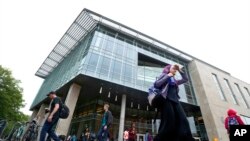
The state of Virginia has banned legacy admissions to public colleges and universities.
The New York Times reports the state has outlawed the practice of giving preferential admissions status to students based on connections to alumni and donors. (March 2024)
New Texas Law Prohibits Public Colleges, Universities From Having DEI Offices
A new Texas law prohibits public universities from having special programs supporting minority and LGBTQ students. Critics say these diversity, equity and inclusion programs are discriminatory and divisive. But many students say they are needed. Deana Mitchell has the story from the Texas capital.
Here’s What It Feels Like to Find Home Between Two Cultures
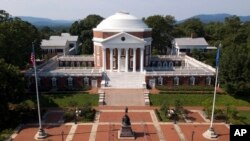
Cynthia Jia, a student at the University of Virginia, writes about how Chinese literature helped reconcile her to being part of two cultures. Read her story in The Cavalier Daily. (February 2024)
FAFSA Delays Prompt California to Extend Deadline for Financial Aid Applications

The California Legislature on Thursday voted to give prospective college students more time to apply for two of the state's largest financial aid programs after a glitch in the federal government's application system threatened to block up to 100,000 people from getting help.
California had already extended the deadline for its financial aid programs from March 2 to April 2. On Thursday, the state Senate gave final approval to a bill that would extend it again until May 2. The bill now heads to Governor Gavin Newsom.
"Clearly, our students need our help," Assemblymember Sabrina Cervantes, a Democrat from Riverside who authored the bill, told lawmakers during a public hearing earlier this week.
California has multiple programs to help people pay for college. The biggest is the Cal Grant program, which gives money to people who meet certain income requirements. The state also has a Middle Class Scholarship for people with slightly higher incomes.
Students can apply for these state aid programs only if they first complete the Free Application for Federal Student Aid, commonly known as FAFSA.
This year, a computer glitch prevented parents from filling out the form if they did not have a Social Security number. That meant many students who are U.S. citizens or permanent residents but whose parents are not were blocked from completing the form and thus could not apply for California's aid programs.
California has a large population of adults who are living in the country without legal permission. The California Student Aid Commission, the state agency in charge of California's financial aid programs, estimates as many as 100,000 students could be affected by this glitch.
The U.S. Department of Education says it fixed the problem last week, but those families are now a step behind. Democrats in Congress raised alarms last month, noting that the delay could particularly hurt students in states where financial aid is awarded on a first-come, first-served basis, including Illinois, Kentucky, Missouri, Oregon and Texas.
Advocates fear that the chaos of this year's process could deter students from going to college at all, especially those for whom finances are a key part of the decision.
The computer glitch is just one part of larger problems affecting FAFSA.
The notoriously time-consuming form was overhauled in 2020 through a bipartisan bill in Congress. It promised to simplify the form, going from 100 questions to fewer than 40, and it also changed the underlying formula for student aid, promising to expand it to more low-income students.
But the update has been marred by delays, leaving families across the country in limbo as they figure out how much college will cost.
The form is typically available to fill out in October, but the Education Department didn't have it ready until late December. Even then, the agency wasn't ready to begin processing the forms and sending them to states and colleges, which only started to happen this month.
The problems appear to have already reduced California's application numbers. Through March 8, the number of California students who had completed FAFSA was 43% lower than it was at the same time last year.
"The data most concerning me seems to suggest that these drops are more acute at the schools that serve low-income students or large populations of students of color," Jake Brymner, deputy chief of policy and public affairs for the California Student Aid Commission, told lawmakers in a public hearing earlier this week.
The issue has caused problems for colleges and universities, too. The University of California and California State University systems both delayed their admissions deadlines because so many prospective students were having trouble with FAFSA.
What Does Ideal MBA Applicant Look Like?

Strong math and communication skills are necessary, for starters. Read Anayat Durrani’s breakdown for US News & World Report. (February 2024)
Biden Administration Has Canceled at Least $138 Billion of Student Debt
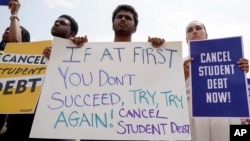
The latest tranche of debt forgiveness came out February 21. Learn how the Biden administration cancels debt in this piece by Gabriel T. Rubin and Rosie Ettenheim of The Wall Street Journal. (February 2024)








